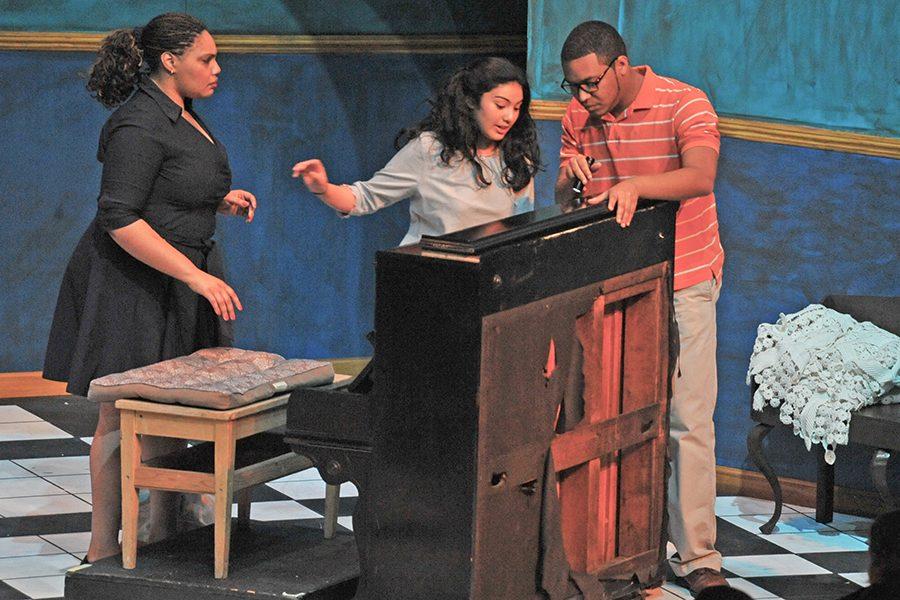Intimacy fortifies play
Piano tuner Victor Manuel (right) played by Sean Teal, flashes a light into a piano as Sofia Celia, played by Jelaine Maestas, and Maria Celia, played by Akilah Kamau, watch during a performance of “Two Sisters and a Piano” in the Knox Center on Thursday.Piano tuner Victor Manuel (right) played by Sean Teal, flashes a light into a piano as Sofia Celia, played by Jelaine Maestas, and Maria Celia, played by Akilah Kamau, watch during a performance of “Two Sisters and a Piano” in the Knox Center on Thursday.
Mar 29, 2017
A wonderful, well-performed and intimate play opened up the latter half of the drama department’s 2016-17 theater season.
“Two Sisters and a Piano,” written by Cuban playwright Nilo Cruz and directed by drama professor Tara Blau, is a great play with strong acting and good attention to detail as the set, sound, and video elements make it easy to buy into the world and invest in its characters.
The play takes place in a small apartment in early 1990s Havana, Cuba during the Pan-American Games. A married writer, Maria Celia Obispo, played by Akilah Kamau, and her younger pianist sister Sofia, played by Jelaine Maestas, are under house arrest after serving two years in prison for Maria’s politically charged writing.
Two outsiders enter into the sisters’ lives during the play. The first is Lieutenant Portuondo, played by Diego Loza, a Cuban military officer who enters into the sisters’ home and gains an interest in Maria. The second is Victor Manuel, played by Sean Teal, a piano tuner who appears in act one and has a short relationship with Sofia.
There was audience seating available on the stage and it was a smart decision to allow it. Being so close to the actors allows the subtle moments to truly shine in a way that might not be appreciated from the back of the house. The closeness also gives the feeling of being in the apartment with the Obispo sisters.
This show’s strength is how the actors interact with one another. The chemistry between Kamau and Maestas is the best part of the show. Each of their interactions are natural. There are moments throughout that felt just like two sisters arguing or laughing and the audience is just peeking into someone’s real life.
Kamau and Maestas had great, small, non-verbal communications that are noticeable due to the close proximity. A glance or small touch told a lot about who their characters are and what emotions they are going through at that moment.
Unfortunately, some of these great non-verbal acting moments are lost and hurt the emotional impact of certain scenes because several times their backs would be facing the audience. It didn’t seem intentional, just poor positioning on stage.
The natural interactions aren’t just between the sisters, but the moments Kamau and Maestas have interacting with Teal and Loza are enthralling. The short moments Maestas and Teal have together are lighthearted and cute, but even during these lighthearted moments there is an overlaying sense of dread. Usually that dread comes from Lt. Portuondo entering the Obispo home.
Lt. Portuondo’s presence in every scene is a reminder of the situation the sisters are in. He steps into their home like it’s his place. He represents the oppressive regime that led to the Obispo sisters’ imprisonment.
Loza portrays his character confidently and creates tension throughout all of his interactions. The moments when he asserts himself or becomes angry, the whole mood shifts and becomes uncomfortable. There are a lot of moments that Loza sounds stiff in the delivery of his lines but it’s a small issue made up by his overall strong presence.
The sound and video elements contribute positively to the overall atmosphere. Cuban music played in between scenes is just a nice addition to add to the mood. Another nice addition is the use of video to open the first and second acts establishing the historical context of the time in which the play is set.



